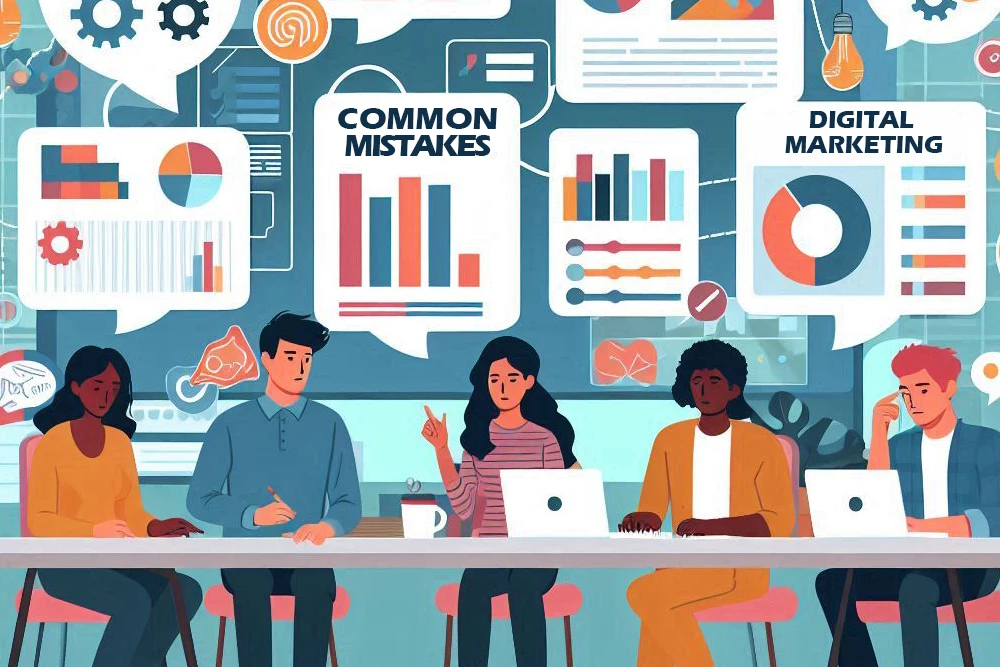In the fast-paced and ever-evolving world of digital marketing, it’s easy to make mistakes that can cost time, money, and opportunities. Whether you’re a small business owner or part of a large marketing team, understanding the common pitfalls in digital marketing and learning how to avoid them is crucial for success.
common digital marketing mistakes and offers actionable solutions
In this post, we’ll explore 10 of the most frequent mistakes marketers make and offer practical tips on how to steer clear of them.
1. Neglecting to Define Clear Goals
One of the biggest mistakes in digital marketing is starting campaigns without clear, measurable goals. Without a defined target, it’s like setting out on a road trip without knowing the destination.
How to Avoid It:
Start by setting SMART goals—Specific, Measurable, Achievable, Relevant, and Time-bound. Whether it’s increasing website traffic, improving conversion rates, or growing social media engagement, having clear goals helps you stay focused and measure the success of your efforts. Use tools like Google Analytics to track your progress and adjust your strategy as needed.
according to brandvm :
In particular, setting measurable goals is crucial to success. Unclear objectives when implementing a digital marketing endeavor will result in wasted resources and ineffective campaigns that ultimately only serve to waste money. The best way to create well-defined goals is to focus on implementing SMART goals, also known as specific, measurable, achievable, results-focused, and time-bound goals.
2. Ignoring SEO (Search Engine Optimization)

SEO is the backbone of digital visibility. Many businesses overlook its importance, thinking they can achieve success through paid ads alone. This short-sighted approach limits organic growth and long-term sustainability.
How to Avoid It:
Focus on both on-page and off-page SEO. On-page SEO includes optimizing content, meta descriptions, and using the right keywords. Off-page SEO, such as link-building and social signals, boosts your website’s authority. Regularly update your website with fresh, keyword-optimized content, and always monitor your SEO performance with tools like SEMrush or Moz.
3. Overlooking the Power of Social Media

Social media isn’t just for sharing photos of your lunch; it’s a powerful marketing tool that can connect you with potential customers, build brand awareness, and drive traffic to your website. However, many brands fail to leverage social media effectively.
How to Avoid It:
First, choose the platforms that best align with your target audience. For example, LinkedIn might be more suitable for B2B, while Instagram could be a better fit for lifestyle brands. Consistently engage with your audience, post relevant content, and interact with followers. Remember to use hashtags wisely, and experiment with paid social ads to increase reach.
4. Failing to Create Engaging Content
In today’s digital landscape, content is king. But simply creating content isn’t enough. If your content doesn’t engage or provide value to your audience, it won’t get the results you want.
How to Avoid It:
Focus on creating high-quality content that solves problems or answers questions your audience has. Use a mix of formats, such as blog posts, videos, infographics, and podcasts, to cater to different preferences. Keep the tone conversational and ensure your content is easy to digest. Don’t forget to optimize for SEO to improve visibility.
5. Not Utilizing Data Analytics Effectively

Data is one of the most powerful assets in digital marketing. Yet, many marketers fail to analyze and interpret data properly, relying on gut feelings rather than hard facts.
How to Avoid It:
Leverage tools like Google Analytics, Facebook Insights, and other data-driven platforms to monitor your campaigns. Regularly track key performance indicators (KPIs) such as traffic sources, bounce rates, conversion rates, and engagement. Use this data to adjust your strategies in real-time for optimal results.
6. Focusing Too Much on Traffic Instead of Conversions
While driving traffic to your website is important, it’s equally critical to focus on converting that traffic into leads or sales. Many businesses obsess over traffic numbers but fail to optimize their website or landing pages for conversions.
How to Avoid It:
Ensure your website is user-friendly, mobile-optimized, and fast. Use clear calls-to-action (CTAs), persuasive copy, and intuitive navigation to encourage visitors to take the next step, whether it’s signing up for a newsletter, downloading a guide, or making a purchase. A/B testing different elements of your site, such as headlines and CTA buttons, can help you maximize conversions.
7. Underestimating the Power of Email Marketing
Email marketing is often neglected in favor of social media or paid ads. However, email remains one of the highest ROI-generating channels in digital marketing. Ignoring it means missing out on a valuable opportunity to nurture relationships with potential and existing customers.
How to Avoid It:
Build and maintain a clean, segmented email list. Personalize your emails based on subscriber interests, past behaviors, and demographics. Use compelling subject lines to increase open rates and optimize your emails for mobile devices. Finally, test and measure your email campaigns to improve results continuously.
8. Not Adapting to Mobile Users
With over half of internet traffic coming from mobile devices, neglecting to optimize for mobile is a critical mistake. If your website or ads aren’t mobile-friendly, you risk losing a significant portion of your potential audience.
How to Avoid It:
Ensure your website is responsive and provides a seamless user experience across all devices. Test your site on various mobile devices to make sure it loads quickly and functions properly. Similarly, when running digital ads, ensure they’re optimized for mobile screens, as a poor mobile experience can hurt your brand’s credibility.
9. Overlooking Customer Feedback and Reviews
Customer feedback is an invaluable source of insight. Ignoring reviews, testimonials, and direct feedback can leave you blind to customer pain points or areas where your service or product could be improved.
How to Avoid It:
Encourage customers to leave reviews, and actively monitor them on platforms like Google Reviews, Yelp, and social media. Respond to both positive and negative reviews with professionalism and empathy. Use feedback to refine your products, services, and customer experience to build trust and improve your offerings.
10. Not Testing and Experimenting Enough
The digital marketing landscape is always changing, and what worked yesterday may not work tomorrow. Failing to experiment with new strategies or test different marketing tactics can prevent you from staying ahead of the competition.
How to Avoid It:
Adopt a mindset of continuous improvement. Regularly test new ideas, from ad creatives to landing page designs, and see what resonates best with your audience. A/B testing, multivariate testing, and heatmaps are great ways to assess different versions of your website or ads and optimize for the best performance.
Conclusion
Digital marketing is a dynamic field with countless opportunities for growth, but it’s also easy to make mistakes along the way. By avoiding the common pitfalls outlined above, you can ensure that your marketing campaigns are more effective, efficient, and ultimately successful. From setting clear goals to optimizing your website for mobile users, these strategies will help you build a solid foundation for long-term success in the digital world.
Remember that digital marketing is not a one-size-fits-all approach. The key is to test, measure, and adapt as you go. Keep learning, stay updated with industry trends, and always be ready to evolve your strategies to meet the needs of your audience.
By consistently avoiding these common mistakes, you’ll not only enhance your marketing performance but also build stronger relationships with your customers and increase your brand’s overall impact in the digital space.
Frequently Asked Questions
1- Why is setting clear goals so important in digital marketing?
Setting clear goals gives your digital marketing efforts direction. Without specific, measurable, and achievable goals, it’s difficult to track success or adjust your strategy. Clear goals ensure you stay focused on what matters and guide your decisions based on data, not guesswork.
2- What’s the biggest mistake people make with SEO?
The biggest SEO mistake is neglecting it altogether or focusing solely on short-term tactics like keyword stuffing. SEO is a long-term strategy that requires optimizing both content and technical aspects of your site to build authority and attract organic traffic over time.
3- How can I improve my social media engagement?
To improve social media engagement, focus on posting content that resonates with your audience. Engage actively by responding to comments, running polls, and encouraging conversations. Additionally, using relevant hashtags, timing your posts for maximum reach, and investing in paid social campaigns can also boost engagement.

